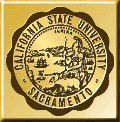|

|
EDEA 255 Field
Experience Seminar
Course Overview
California
State University, Sacramento
Educational Administration and Policy Studies
College of Education
Spring, 2002
|
|
|
|
Why take
this course
Technology
Benefits
of Online Learning
Successful
Student Characteristics
Instructor
|
EDEA255 Field Experience Seminar. Experience
and practice in observation and analysis of school environments.
This course will explore the many special challenges and salient
issues confronting educators in leadership positions at the building,
district, and central office levels. Students will research and examine real and perceived
challenges facing today’s educational leaders.
This class is a prerequisite to EDEA 495, “Field Study in
Educational Administration” and may not be taken concurrently.
Prerequisites:
Admission to the Educational Administration Program; completion
of 12 units of coursework including EDEA 201, 205, or 206, and approval
of faculty advisor. 3
units.
Number of Units: 3
Grade: Credit / No Credit
|
|
|
Why
take this course
This course is required in the program leading
to the Preliminary California Administrative Services Credential.

|
|
|
Technology
Students will need an electronic mail account and
computer access to the Web. All CSUS students enrolled in
one or more units can create a SacLink
account for electronic mail and Internet services. Although
a home computer with a high speed modem running Netscape or
Internet Explorer would be beneficial, students can use the
Web from one of the campus
student labs. Check out Computer
Hardware Recommendations for CSU, Sacramento Students
for more information about equipment.
Computing
Recommendations
|
Comfortable using
the computer and browsing the Web
|
|
Windows compatible
Pentium running Windows NT,or Windows 95/98 or
Macintosh compatible with System 8
|
|
32M RAM (preferably
64M)
|
|
28.8K or faster
modem - preferably 56K
|
|
Microsoft Internet
Explorer or NetScape 4.0 (or higher)
|
|
SacLink or other
Internet Account
|
|
Word processing
skills
|
|
Online class
participation on the Web assignments and electronic
discussions.
|

|
|
|
Benefits of Online
Learning
- Flexible
Scheduling: Students generally work full-time,
many have family responsibilities, and many live a
distance from campus. Being able to complete selected
course units from home or work without attending weekly
classes should be a major convenience.
- Enhanced
Learning: Time saved traveling to and from
campus (and looking for parking) can be redirected to
learning!
- Adult Learners:
As highly motivated learners, students can actively
pursue areas of greatest interest rather than sit through
lectures aimed at the whole group.
- Increased Interaction with
Classmates: Web-based communication tools can
actually increase interaction among students by
permitting group work that would be difficult to arrange
if students had to meet in the same place at the same
time.
- Virtual Office
Hours: Electronic communication between
students and the instructor can actually increase the
degree of our interaction, since you can e-mail me at
your convenience, rather than find time to get to my
office or reach me by phone.
- The Web's the Limit (not the
instructor): The World Wide Web has a wealth
of resources from which you can learn a great deal more
than I can teach you. Everywhere, the role of the faculty
is being reconceptualized as that of "coach" rather than
"instructor". Students are perfectly suited to take
advantage of coaching to get out of the course what will
be of most value to them.
- Electronic Competency on the
Job: The
competence in dealing with electronic environments that
you develop in this course will be of great value to you
in your workplace.

|
|
|
Successful Student
Characteristics
- Discipline to complete projects by deadlines instead
of waiting until the end of the semester.
- Motivation to read, write, and participate fully in
class activities.
- Time to devote approximately 9 hours a week to a
3-credit course.
- Ability to work independently and in teams.
- Flexibility in dealing with technology
problems.

|
|
|
Instructor
More information is available on Dr.
Lee's homepage. You may contact the instructor via
e-mail at elee@csus.edu.

|
|
|
